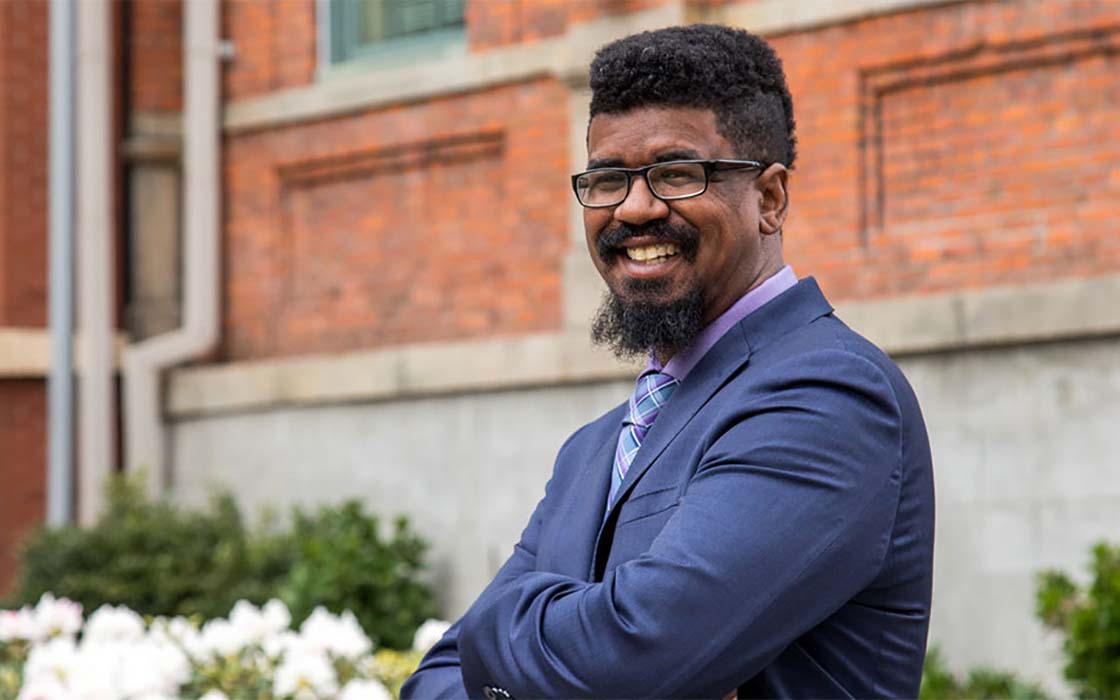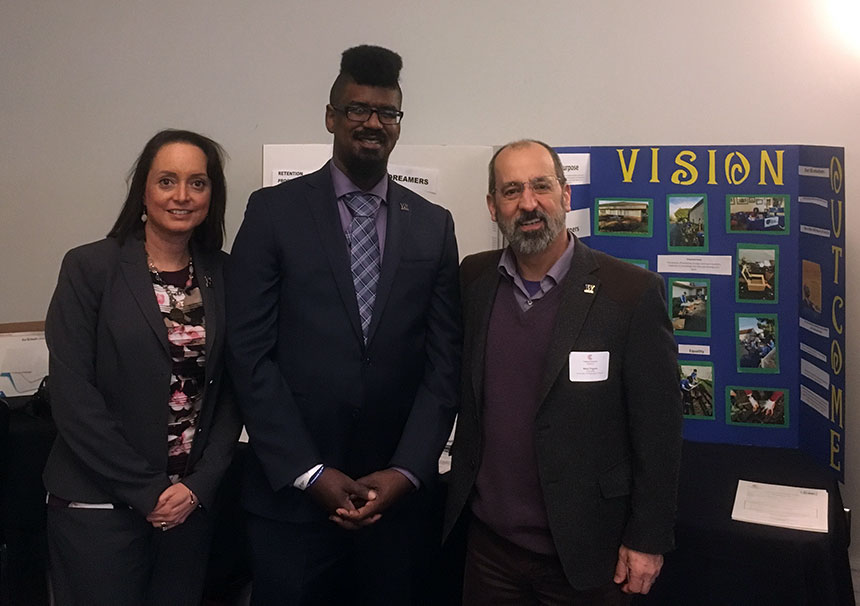
Eric Ballentine: The Purpose-Driven Life
Eric Ballentine, '18 Urban Studies, is "just a guy doing what he loves to do," which includes helping veterans navigate through college.
UW Tacoma senior Eric Ballentine didn’t always feel like he had a purpose. But after working as UW Tacoma’s Vet Corps Navigator, the UW Tacoma senior is spending his time helping others find theirs.
Ballentine always had a connection with the armed forces. His father served in the U.S. Navy for over 20 years, which meant Ballentine grew up immersed in military culture. "It was very interesting, because you're just kind of thrust into having to adapt quickly and consistently moving around,” Ballentine said. “You're embedded in that military culture.”
For Ballentine, being raised in a military family was difficult at times. His childhood consisted of early mornings and an orderly life. But it also made planning his future simple. Ballentine knew that when he finished high school he wanted to serve his country. "College was never really a thing for me," he said. “As far back as I can remember I wanted to be in the military."
Yet, while Ballentine grew up the child of a sailor, he didn’t want to enter the Navy like his father. He was attracted to another branch of the military: the Army. "There was something that I really like about the Army," Ballentine said, so he joined up in the summer of 2000.

Ballentine was stationed in what was then known as Fort Lewis—now Joint Base Lewis-McChord—as a military police officer. At the time, the country was experiencing what he called a “peace time period.” But in July 2001, Ballentine was training in Yakima and had a car accident. The vehicle rolled over four times and two passengers were ejected. As the driver, Ballentine suffered from not only back pain and a concussion but also immense guilt. "It was really tough dealing with that physically and psychologically,” Ballentine said. “I got better physically, but I felt a lot of responsibility for the crash.”
Ballentine had little time to heal from his accident. Just two months later 9/11 happened. In October 2001, he was stationed in Kosovo on a peacekeeping mission, staying there for about seven months before being relocated to the Pentagon. Then in January 2004, orders came for deployment. "Next thing I knew I was on a plane to Iraq," Ballentine recalled.
In Iraq, Ballentine attempted to balance the chaos of war and his own battle with mental illness. Then, after being deployed for only six months, he contracted a virus. Doctors struggled to diagnose him, and in the meantime Ballentine’s lung collapsed and his spleen enlarged almost to the point of rupture. He was in the ICU for approximately two weeks until being medevacked to a hospital in Germany. There, Ballentine found out what was making him so sick. He had pneumonia. After some trial and error, his body finally began responding to an antibiotic.
While his health had improved, Ballentine wouldn’t return to Iraq. Instead, he went home to America. He expected to return to duty once he healed. Ballentine met with another doctor who asked him if he had sickle cell anemia, a blood disorder that contorts red blood cells into sickle-like shapes. He answered no, thinking he just had the trait. The doctor ran blood tests. "Come to find out that I didn't just have the trait,” Ballentine said. "I had the full-blown disease."
Ballentine was no longer in the process of healing to rejoin the Army. He was in the process of getting out of the military altogether. Seeing as people with sickle cell anemia are disqualified from serving, Ballentine was no longer fit for active duty. He was put on administration and light service until he left the army on a medical discharge in 2005.
In a matter of months, Ballentine went from serving in the military with a clear objective, to being a citizen without direction. "Before, I didn’t have to think about what my purpose was because the military told me,” he said. He took a job doing the only thing he knew. "I just did what I thought I was supposed to do once I got out, which was security."
Ballentine felt fruitless. He worked dead-end jobs with no growth, and his mental health was in disarray. "Depression was really, really hard on me, in addition to PTSD and dealing with issues from a concussion, which I did not know was still affecting me.”
In hopes of finding a purpose, Ballentine started volunteering with Mission Continues, a nonprofit organization helping veterans adapt to civilian life through community service. "The idea is even though you’re no longer serving your country, we still need you. You can serve your communities,” Ballentine said. He served on projects based on the needs of the community.
Through his community service, Ballentine met someone who connected him to Vet Corps, a program funded through AmeriCorps that helps veterans in higher education. In 2009, Ballentine started attending school at Tacoma Community College (TCC). He worked as the Vet Corp Navigator at TCC, serving in that position until last fall when he brought his experience helping veterans in education to UW Tacoma.
“I want people to see what's out there. I'm just a guy doing what he loves to do. It's not work for me.”
Now working as the Vet Corp Navigator in the Veteran and Military Resource Center and as the platoon leader for the Tacoma 1st Service Platoon for Mission Continues, Ballentine strives to create a support system for those who’ve served. He describes his position as, “[empowering] veterans and their families to reach their educational goals,” and that includes supporting them in finding their purpose. He’s also a student, graduating June 11 with a degree in urban studies and community development and planning.
One of the ways Ballentine helps veterans uncover their goals is having them do what he did: community service. This past Martin Luther King Day of Service, Ballentine gathered a group of 80 people, almost half of which were from UW Tacoma, to spend the day volunteering at Tacoma Community House.
The service day consisted of doing demolition, neighborhood cleanup and opening up a conversation about leadership and the importance of serving the community. "As veterans sometimes we're closed off, and I'm guilty of this too,” he said. "On the service day I could see the attitudes of a lot of the veterans change. I want people to see what's out there, and why you shouldn't isolate yourself."
Ballentine’s commitment to helping veterans in education and his community drives his actions, and it hasn’t gone unnoticed. In March, Ballentine was one of two UW Tacoma students presented with the Presidents’ Civic Leadership Award, an award recognizing students who confront the issues faced by their campuses, from Students Serving Washington. In May, Ballentine received the 2018 Rod Hagenbuch Gift of Service Award from UW Tacoma.
Eric Ballentine’s time at UW Tacoma can be summed up in two words: purpose-driven. But while education and service helped transform his own life, he hopes his work pushes others to realize their own power in effecting change. “I'm just a guy doing what he loves to do. It's not work for me,” Ballentine said. “So if people can see that and they're willing to give me an award, I hope they understand that they can do it too.”



